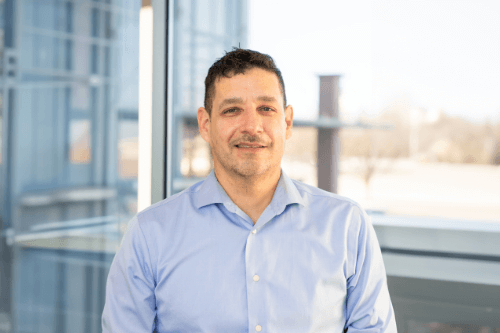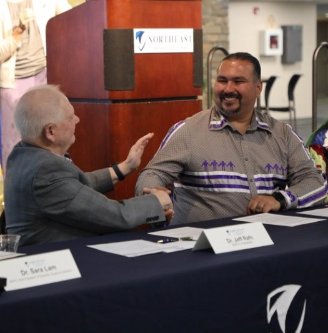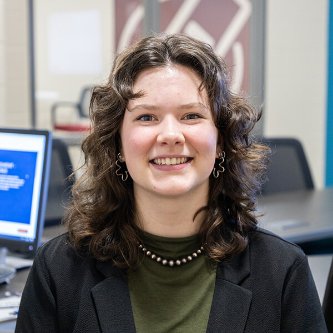
EMT instructor honored for ‘extraordinary contributions to EMS education’
Cregg Suess, NWTC EMT instructor, is the recipient of the 2024 WEMSA Educator of the Year Award.
Cookies on NWTC's Website

The recent ransomware attack on Colonial Pipeline has highlighted the importance of cybersecurity on a national level. One of NWTC's experts, Molly Vollrath, shares her thoughts on how we, in Northeast Wisconsin, can protect our own privacy and online data.
Q: What is cybersecurity?
A: The definition used most often is from the Cybersecurity and Infrastructure Security Agency (CISA): "Cybersecurity is the art of protecting networks, devices, and data from unauthorized access or criminal use and the practice of ensuring confidentiality, integrity, and availability of information." This means understanding how much of your personal information you have made easily available on your computer, smartphones, social media accounts, or online services, like banking. Cybersecurity is the practice of understanding the weaknesses in these devices, services, and the people who use them – then taking measures to protect yourself, as well as your privacy, from cyber-attacks.
Q: How are we at possible risk in Northeast Wisconsin?
A: First, when we think about risk, there are several different pieces cybersecurity analysts take into consideration when they look at risk and risk management.
This means every person, computer, and business in Northeast Wisconsin is at risk. Cyber criminals are commonly acting from outside your geographical area, and anyone with an internet connection then becomes a possible target to be attacked. My favorite cybersecurity teacher, Ryan Van Scyoc, always says, "The only way to eliminate risk is to take all the computers off the network, shut them down, and destroy the hard drives." Given how technology is integrated into our daily lives and jobs, we must accept that risk. The more information you have available online, whether that be online banking information, pictures on Facebook, or even your Amazon account, the more risk you have. This is the same for a person or an organization.
Q: What are ways we can keep our data and privacy safe online?
A: The first step to keeping yourself safe online is recognizing your risks. Not everyone's risks are the same. Some attackers only target government agencies, while a person at home should be more concerned about phishing emails or clicking onto a dangerous website. Identifying what you can change in your online habits to improve your security is an important way to keep yourself safe. Also, look at your devices that use the internet, whether that be a smart phone, computer, or tablet. Make sure they are set up safely and only access the internet through your home network, private work network, or your phone hotspot. Never connect your device to any public Wi-Fi. Attackers can set up tools on public Wi-Fi to collect your data as it crosses to the internet. You can help minimize your risk both personally and in the workplace by following these best practices from CISA:
Q: Is there a need in our area for more information technology professionals to be trained in cybersecurity?
A: Absolutely. COVID has changed all businesses to a hybrid work environment, and cyberattacks have become more frequent, complex, and increased the number of targets since the start of the pandemic. With the cost to a company of dealing a security breech continually on the rise (already in the millions), the need for skilled cybersecurity professionals in every business is growing tremendously. Cyber criminals are constantly working to develop new ways to gain access to networks. Their new techniques can go undetected by even the newest anti-malware software, so every business needs individuals who have the skills to detect malicious activity before it brings down an organization. According to the Bureau of Labor Statistics, the number of individuals employed within the cyber security sector is slated to grow by 31% between 2019 and 2029. That rate far exceeds the average for all occupations. Any business that uses the internet needs to then consider hiring a cybersecurity professional or paying a company that does cybersecurity consulting in order to keep up with how fast technology is changing.
Q: What do I need to know to get started in this program?
A: An individual who is considering pursuing cybersecurity should have a strong problem-solving mindset and attention to detail. You're taking a lot of small details in the traffic that happens on a network (an example of traffic would be a user sending an email) and looking for the needle in the haystack. Attackers use techniques to gain access into a system by trying to fool computers into thinking they're routine activities the machine normally does. It's being the kind of individual who can use strong logic and reasoning to determine what is legitimate and illegitimate. Something that attracts a person to pursuing any information technology degree is the want to keep learning and evolving. If you want to get started in information technology, you need to understand that continued education is lifelong because the field is so fast changing. What is up-to-date when you are student quickly becomes outdated within a few years. Because of this, being an adaptable person as well as a fast learner is extremely important.
All that being said, one of the most rewarding pieces of this program is taking a strong foundational skill set provided by the teachers and being able to continually reapply those concepts to new technology. Learning the techniques hackers use to break into computers and being able to utilize that knowledge in a way that creates a strong cybersecurity policy for an organization is one of the most exciting pieces of pursuing a career in cybersecurity. I would highly recommend this program to a person who is looking for a challenge and finds satisfaction in solving difficult puzzles.
Find out more about how to get started in Cybersecurity at NWTC.

Cregg Suess, NWTC EMT instructor, is the recipient of the 2024 WEMSA Educator of the Year Award.

Oneida Nation has been named the 2024 NWTC Soar Higher Partner Award recipient.

Kaelynn Hauser took several dual credit classes in high school – earning both college and high school credit for those classes.